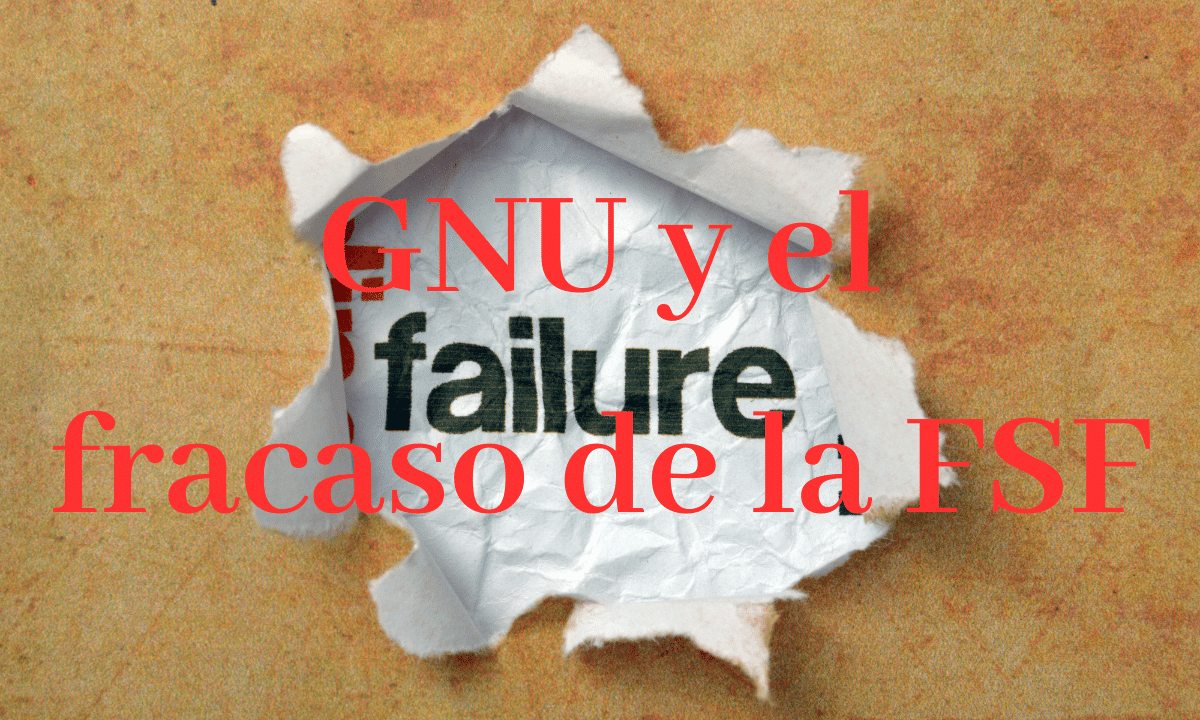
At previous article I began to argue my opinion that the GNU Project failed. In this one I will go further since I'm going to talk about the GNU project and the failure of free software since I believe there is a relationship between the two and it is the responsibility of Richard Stallman.
Can we talk about the failure of free software? If you're reading this on your mobile, you're probably reading this on Android or iOS, not FirefoxOS or Ubuntu Touch. You probably heard about it from Google Discover, Google Group notifications, Twitter or Facebook, not from Mastodon. And, if you are using an open source browser, it is either based on Chromium (de facto standard imposed by Google under penalty of denying compatibility with its services) or Firefox which is more interested in political correctness than in making a good browser. I would say yes.
About the GNU project and the failure of free software
LAt this point you can make two objections to me.
- That the free software movement never intended to be massive.
- That Linux dominates in servers, supercomputers and the cloud.
Let's look at one objection at a time.
Although it was born with the aim of giving legal protection to the tools of the GNU project, the Free Software Foundation soon extended its actions to campaigns to boycott proprietary tools and replace them with free ones. Since most people still use Google Docs on their Windows, buying books on Amazon and using Apple hardware don't seem to have had much success
2) The success of Linux is not due to people being convinced of the advantages of being able to access, study, modify and distribute the source code of a program. I eat very well explained Microsoft's Steven Sinofsky. IBM and other computer service providers to the corporate market discovered that they could offer their consulting and support services based on the Penguin operating system without having to pay expensive licenses. of software to a third company.
Stallman's responsibility
Now, the time has come to prove or fail to prove the statement that I have been making for an article and a half.either. Stallman's responsibility.
Richard Stallman He is a programmer who all he wanted was to be part of a team in which information flowed freely so that the work was done regardless of the hierarchies on paper. It is what Canadian author Henry Mintzberg calls an adhocracy.
The problem is that as the Free Software Foundation grew, it needed a more formal structure and, Stallman, as the founder, was assuming a task for which he was not only not prepared, nor did he like it, that of leader.
The free software movement needed a Jobs, or at least the Shuttleworth of the early days of Ubuntu. The GNU project needed Stallman.
A Jobs, or even a Shuttleworth or Bill Gates would have had the instinct to know what people needed and convince them that it was what they wanted. A Stallman would have transformed that into well-written code and would have convinced the best developers to publish their work under free licenses
But, the political Stallman beat the programmer Stallman. And since except for Firefox (when Google, for its own convenience, promoted it on the search engine's main page) almost no free software project became widely known, there were never enough independent funds to compete with commercial developments. Open source projects resorted to corporate sponsorship and, as the CentOS case shows us, that sponsorship is never disinterested. We have already seen cases of some projects that ended up changing their license.
There is no doubt that there are free software programs of equal or superior quality to the proprietary ones. That there is no free software project that people massively love to use like TikTok, Google Docs, Canva or ChatGPT too.
And, blame that on the political Stallman who was more interested in demonizing the software and hardware that people liked to use. than in giving free rein to the programmer Stallman to work his magic.
Would it have changed anything if the GNU operating system had been terminated? In my opinion yes. Stallman was a much better programmer and had much more experience than Linus Torvalds when he created Linux. And, with a good leader in the FSF, capable of understanding the needs of the market, GNU would have taken the place that Windows ended up taking.
But, everything is open to opinion and there is the comment form below.

Hello,
There are different points on which I disagree. But above all, if Stallman had dedicated himself to programming...
The beauty of Linux lies in its development model and not so much in whether Torvalds is a better or worse programmer. This is evident in "the cathedral and the bazaar" where the two development models are clearly differentiated... and I say more, Git is the most palpable example...
Linux has arrived where you have arrived thanks to the fact that it is a collaborative model, while the GNU tools have stayed that way... and little by little they are being surpassed by Open Source tools with better features and better performance.
I can't say that Stallman is responsible, but I can say that too much effort has been placed on one person.
Thanks for your article
Your contribution is very interesting.
The complaint that free software has not had enough independent funding compared to proprietary software is absurd.
Obviously, private software has more money, because for exactly that reason it is private.
Free vs private software is almost like communism vs capitalism. People have to want to do things not for economic compensation, at least direct economic compensation. And thanks to the fact that there are altruistic people, or those who are looking for a resume, cache, fame, or giving the big guys a hard time, we have free software, but let's not expect that the companies that make money selling software will make altruistic income from free software, because when they see Those who earn more by privatizing it, are going to do it. They call it capitalism. To seek blame is to place it on the essence of the human being, on why voracious capitalism has been able to do everything.
Signed: a capitalist entrepreneur who also contributes to GitHub for the love of art.
¿??
In fact, today most of the contributions to the Linux kernel are from developers paid by companies.
In any case, the problem is not that free software wants to benefit from companies but quite the opposite. Companies that benefit from free software and not only do not return anything, but do not even respect the terms of the license.
It happened to WordPress with Wix, Elastic with Amazon and OBS Studio and Terraform also had problems.
The problem with Heartbleed was due to a contribution from a volunteer when there were large companies that used OpenSSL and did not contribute a single euro.
I disagree with several points in the article _but_ I see a fairly obvious error. If using an Android cell phone (vs FirefoxOS or Ubuntu Touch) is used as an example of the "failure of Free Software", this completely ignores the fact that the Android kernel is... Linux. With which the phrase would have to be adjusted to "That Linux dominates in servers, supercomputers and the cloud... and cell phones.
It's Linux without the GNU tools and all the mandatory Google services
Android Open Source Project (AOSP) is open source/free software, as are derivative products such as LineageOS.
I mention this because Android, although it contains proprietary components such as GApps, is not the best example that the OS of our phones are not free software, in fact it is almost the opposite, an example of the popularity of the open source model.
I think you're right in some ways about the massive commercial failure of the GNU project. But you're just staying at that and Richard Stallman and the GNU project is much more than that, it has a much greater importance than that.
If you do not agree with the approaches of Richard Stallman and free software, that's up to you. That Stallman makes mistakes is also true, but we must recognize that he deserves to be called the father of free software with all the merits that this means.
The four freedoms are very important, the GPL and public domain software are as important in the software universe as public institutions are in a society. If you analyze public institutions, they coexist today with private companies, and there are thousands of private companies and some are gigantic. But public institutions, in my opinion, are equally or more valuable and important. Therefore, just as public institutions are far from being a failure, the GNU is also far from being a failure.
On the other hand, everything has its beginning, its peak and its end. Maybe you are right that GNU may be in decline and at some point, like everything, it will reach its final stage but free software continues.
I think that in your arguments and your presentation of the topic, you are undermining, and not highlighting all the value, the cultural and social heritage and the merit that Richard Stallan and the GNU have. If you tell me economic failure and current massiveness, that is one aspect, but the objective of Stallman and the GNU was never economic, therefore you must measure failure according to the objective. I believe that the objectives and goals that Stallman set are quite high and difficult to achieve, but at the same time his achievements are very visible and meritorious. I believe that few are capable of such achievements; what he achieved in promoting free software is truly a feat.
By the way, I remind you that Linux is almost 100% free software and I don't know if there is other more massive software today, it's just that common people don't know about it. Well, Firefox, the browser I use daily, is also very massive.
Cheers …
I think you are confused. Free software (not open software, mind you, I'm talking about free, Stallman's) is not a commercial model, nor a speech to sell software, nor a formula to print paper money. Free software is a social, political and cultural movement.
In addition, you can find free software everywhere, from watches, refrigerators or cars, to payment systems, servers, business networks, video game consoles, space programs or even within the proprietary software itself. So talking about its failure is meaningless.
But, if it is so widespread, why is it so difficult to make a living from it?
Because it is not compatible with capitalism, it is antithetical in nature to the economic system of contemporary society.
Then it can't have a future, right? After all, money and its accumulation of wealth in small domes is what moves the world.
It's a posibility; Fortunately, FOSS has a great ally in another equally antithetical concept of capitalism, one that the West has been trying to implement for MILLENNIA, with which it shares some characteristics, such as horizontality, but above all for which it becomes an indispensable instrument due to its needs for transparency, I mean democracy.
And there are only two options, either we forget about democracy, or we forget about that system that had its heyday in a long period where production was limited and scarcity was the norm, but which evidently no longer works and we accept that in the end there will only be one type of software, free software.